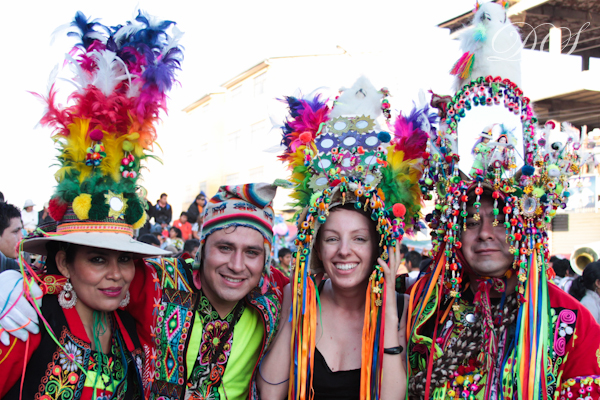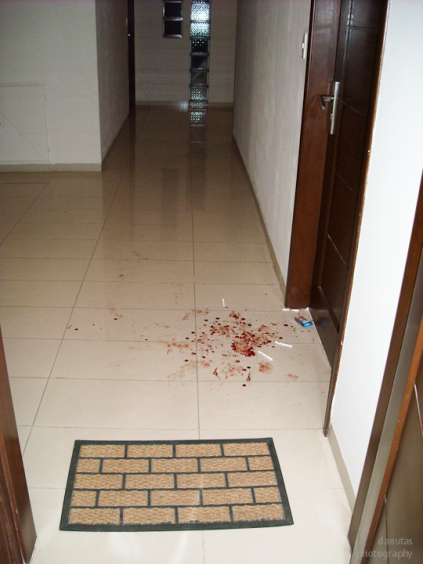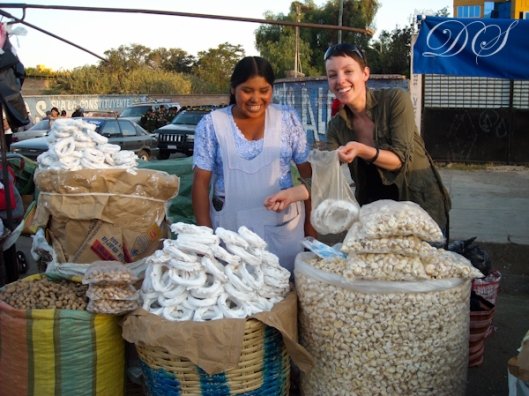Zastanawiałeś/aś się kiedyś nad przeprowadzką do Boliwii? Wiem, że wiele osób o niej marzy, szczególnie tych, którzy już raz odwiedzili ten najbardziej ‘egzotyczny’ kraj Ameryki Południowej. Warto jednak pamiętać, ze Boliwia to nie tylko piękne krajobrazy, interesująca kultura i mili ludzie, których spotkało się na drodze podczas podroży, ale również proza życia, która wcześniej czy później dopada człowieka, który postanowił się tu osiedlić na stale. Jako ekspatka/imigrantka w Boliwii z ponad trzyletnim stażem, często słyszę pytanie typu: ‘czy łatwo się żyje w Boliwii?’. Sama nie potrafię jednoznacznie odpowiedzieć na to pytanie, postanowiłam więc przygotować mały test, który pozwoli wam ocenić, czy nadajecie się na boliwijskiego ekspatę, lub ściślej mówiąc, ekspatę w Boliwii. Test trzeba traktować oczywiście z przymrużeniem oka, ale na pewno daje on do myślenia.
Have you ever thought about moving to Bolivia? I know a lot of people who dream of it, especially those who once visited this most ‘exotic’ country of South America. However, it must be remembered that Bolivia is not only a country of agreat beauty, interesting culture and friendly people met on the road, but also the prose of life, that sooner or later will catch up with everyone who decides to stop by for longer. As an expat / immigrant in Bolivia with 3 years of experience, I have often heared a question: ‘is it easy to live in Bolivia?’. I can’t give a definite answer, so I decided to prepare a small test that will allow you to assess whether you are fit to be the Bolivian expat or, to be more exact, an expat in Bolivia or not. Of course, you must take the test with a grain of salt, but it certainly will give you some food for thought.
Boliwia jest doskonałym miejscem emigracji, jeżeli…/ Bolivia is a great place to emigrate, if …
1. Lubisz tropikalny i wilgotny, umiarkowany i suchy lub zimny klimat (niepotrzebne skreślić) / You like the tropical and humid, temperate and dry or cold climate (check the most appropriate)

2. Delektujesz się prostym jedzeniem – kolbą kukurydzy, kawałkiem suchego mięsa i jajkiem w skorupce lub jesteś wegetarianinem. (Weganie też dadzą radę, jeżeli lubią gotować!) / You enjoy the simple food – corn on the cob, a piece of dry meat and egg in the shell or … you’re a vegetarian. (Vegans should also make it if they like cooking!)

3. Uwielbiasz wielkie parady tradycyjnych tańców, kolorowe kostiumy i monotonną acz skoczną muzykę / You love the big parades of traditional dances, colorful costumes and lively yet monotonous music.

4. Uwielbiasz odwiedzać miejsca nieskażone cywilizacją – pustynie, góry, stepy czy dżunglę / You love to visit places unspoiled by civilization – deserts, mountains, plains or jungle.

5. Interesujesz się przyrodą. Lubisz podglądać leniwce na wolności i nie mdlejesz na widok ogromnego insekta w twoim pokoju, dzieląc swoją prywatną przestrzen z mrowkami / You are interested in nature. You like watching sloths in the wild and don’t faint at the sight of a huge insect in your room, shearing your personal space with ants on a daily basis.

6. Nie widzisz sensu uprawy roślin doniczkowych, kiedy te rosną sobie jakby nigdy nic pod twoim oknem. I to co najmniej 10X większe niż u mamy w domu / You don’t see the point to cultivate pot plants when they grow under your window. And at least 10X bigger than those back home.

7. Lubisz miasta pełne zieleni z parkiem pośrodku zamiast cementowego skweru / You do like cities full of greenery, with a big park in the middle, instead of cement square.
8. Nie przeszkadza ci to, że nie rozumiesz niemal polowy tego, co do ciebie mówią miejscowi. Ważne, ze są uśmiechnięci i kontaktowi:) / It doesn’t bother you when you don’t understand almost half of what the locals are saying to you. What important is that they are smiling :)

9. Nie przeszkadza ci wszechobecny hałas, o każdej porze dnia i nocy / You don’t mind the omnipresent noise at any time of day or night.
10. Nie gniewasz się, nie stresujesz, kiedy ktoś kolejny raz omal nie przejechał ciebie na pasach (kiedy to ty miałeś zielone światło) / You don’t stress out when someone again almost run you over on the zebra crossing (when you had the green light).
11. Z jakiegoś powodu lubisz stać w kolejkach (bo nie pracujesz, masz dużo czasu, bo można poznać nowych ludzi, pogadać, wymienić doświadczeniami – niepotrzebne skreślić / For some reason, you like to stand in line (because you’re not working, have lot of spare time, because you can meet new people, chat, exchange experiences etc.
12. Jesteś krótkowzroczny i nie zauważasz śmieci na ulicy czy ludzi śmieci wyrzucających lub… sam śmiecisz / You are shortsighted and do not notice the garbage on the streets or people throwing out that garbage or… you litter by yourself.
13. Lubisz łamigłówki prawne, zapach kserowanych dokumentów i … wazelinę / You do like legal games, smell of copied documents and … vaseline.
14. Nie liczysz czasu, zegarek nosisz tylko dla ozdoby, wybierasz się wszędzie jak sojka za morze i tego samego oczekujesz od innych / You don’t count the time, wearing the watch just for decoration, being always late and expecting the same from the others.
15. Jesteś łapczywy na komplementy – nie ważne jakie, nie ważne od kogo, ważne by były, najlepiej poprzedzone gwizdami lub sam lubisz bezkarnie zaczepiac kobiety na ulicy / You are greedy for compliments – no matter what kind, no matter from whom, even better if they are preceded by whistles, or simply you like to harass women on the street and get away with it.

fot. Hakim Boulouiz
16. Lubisz bliski kontakt z drugim człowiekiem, szczególnie w autobusie miejskim / You do you enjoy close contact with another people, especially in a city bus.
17. Nie lubisz krytykowac czy zagracać sobie głowy problemami. Żyjesz chwilą i bierzesz życie takim, jakim jest / You don’t like to criticize and bother yourself with problems. You live a moment and take life as it is.

18. Zostajesz najlepszym przyjacielem każdego bezdomnego psiaka i kociaka, którego widzisz na ulicy. Resztki z obiadu nigdy się nie marnują, czasem tylko zapodzieją się w twojej torebce / You become the best friend of every homeless pup and kitten you see on the street. Leftovers are never wasted, sometimes only get forgotten in your purse.

19. Lubisz i chętnie uczestniczysz w cotygodniowych spotkaniach w rodzinnym gronie … mimo iż twoja własna rodzina została za oceanem / You enjoy and willingly participate in weekly family meetings … even though your own family stayed overseas.

20. Jesteś emerytem z dobrą emeryturą/ pracownikiem zagranicznej firmy/ wolontariuszem/ zwycięzcą loterii/ lubiącym ryzyko inwestorem/ poszukiwanym przez Interpol/ hippisem/ lub człowiekiem, któremu dużo do szczęścia nie trzeba / You are already retired with a good pension / an employee of a foreign company / volunteer / lottery winner / risk-loving investor / wanted by Interpol / hippie / or a man who doesn’t need much to be happy.

Wyniki/ Results:
1-5 odpowiedzi na ‘tak’ – daj sobie spokój i zostań w domu/ 1-5 responses to ‘yes’ – don’t bother and better stay home.
5-10 odpowiedzi na ‘tak’ – Boliwia będzie dla ciebie cudownym miejscem na wakacje/ 5-10 responses to ‘yes’ – Bolivia will be a wonderful holiday destination for you.
10-15 odp. na ‘tak’ – sprobuj! Wiza turytyczna wazna jest 3 miesiace, a to sporo czasu na rozpoznanie/ 10-15 resp. to ‘yes’: Give it a try! Bolivian tourist visa is valid for 3 months so you have some time to check it out.
15- 19 odp. na ‘tak’ – dasz rade! Jest szansa, ze Boliwia stanie się twoim nowym rajem na ziemi/ 15 to 19 resp. to ‘yes’ – you can do it! There is a chance that Bolivia will become your new paradise on earth.
20 odp. na ‘tak’ – człowieku! Jesteś w czepku urodzony i wszędzie ci będzie dobrze, szczególnie w Boliwii:)/ 20 resp. to ‘yes’ – Lucky man! You were born with a silver spoon in your mouth and you will be fine everywhere, especially in Bolivia :)

Jaka jest ta ‘moja ekspacka Boliwia’, możecie się przekonać na stronach tego blogu. Boliwia, będąca moim domem przez ostatnie trzy lata, weszła mi w krew, czasem dodając energii, innym razem wprowadzając w stan anemii czy szaleństwa. Boliwia jest różnorodna i zaskakująca, ale nie jak pudelko czekoladek Foresta Gumpa, ale raczej słój magicznych słodyczy Harrego Pottera. Czasem trafi nam się smaczny cukierek, innym razem ohydny, ale zawsze jedyny w swoim rodzaju:) Boliwia jest unikalna, interesująca i piękna, ale również chaotyczna, dziwna i brzydka. To wszystko sprawia, że często w tym samym czasie, kocham ja jak i nienawidzę, ale nigdy nie pozostawia mnie ona znudzoną i obojętna.
You can find out about ‘my own expat experience in Bolivia’ on the pages of this blog. Bolivia, which was my home for the last three years, entered my bloodstream, sometimes adding energy, sometimes leaving me in a state of anemia or madness. Bolivia is diverse and surprising, but not like a box of chocolates of Forest Gump, but rather like a jar of magic sweets of Harry Potter. Sometimes we will get a delicious candy, sometimes disgusting, but always one of a kind :) Bolivia is unique, interesting and beautiful, but also chaotic, strange and ugly. Very often, I love and hate it at the same time, but Bolivia never leaves me bored or indifferent.
Ja jednak testu na ‘boliwijskiego’ ekspatę nie zdałam, choć z czasem, niektóre negatywne odpowiedzi z listy zamieniły się na ‘tak’:) Moja boliwijska emigracja uświadomiła mi, ze każde miejsce na świecie ma swoje plusy i minusy – i cale szczęście, inaczej byłoby nudno! W Boliwii przeszłam prawdziwą szkolę życia. Dzięki emigracji na koniec świata doceniłam rzeczy, które wcześniej uważałam za nieistotne, lepiej poznałam samą siebie i innych ludzi, dochodząc do wniosku, mój charakter jest bardziej kompatybilny z Europą niż Ameryką Łacińską. I bardzo zatęskniłam za rodziną i znajomymi, od których dzieliły mnie nie 2,5 godziny w samolocie, a 15 (nie licząc przesiadek)!
I, in the end, didn’t pass the Bolivia Expat Test, however with time, some negative responses from the list turned into ‘yes’ :) My Bolivian emigration made me realize that every place in the world has its pros and cons – and thanks God – otherwise it would be boring! In Bolivia I went through a real school of life. Thanks to emigration to the end of the world, I appreciated the things that before I took for granted. I got to know myself and other people better and came to the conclusion that my character is more compatible with Europe than Latin America. And what’s the most important – I really missed my family and friends from whom I wasn’t away by mare 2.5 hours by plane but 15 (not counting layovers)!

Myślę, że ten cytat z jednej z ulubionej książek dzieciństwa ‘ Kometa nad Doliną Muminków’ Tove Jansson, jest najlepszym podsumowaniem mojej przygody z Boliwią / I think that this quote from one of my favorite childhood books ‘Comet in Moominland’ by Tove Jansson is the best summary to my Bolivian adventure:
“Musisz udać się w długą podróż, zanim będziesz mogl naprawdę przekonać się, jak wspaniały jest dom.”
“You must go on a long journey before you can really find out how wonderful home is.”
Moja boliwijska odyseja może i dobiegła końca, ale przygoda z Boliwią wciąż trwa! Pozostają mi piękne wspomnienia, pamiątki, przyjaciele i znajomi oraz ten blog, który wciąż zamierzam kontynuować, rozwijać i pielęgnować. Boliwia skradła bowiem moje serce (tak samo jak pewien pól-Boliwijczyk) i z cala pewnością będę do niej powracać od czasu do czasu. Na wakacje;)
My Bolivian odyssey may come to an end, but my Bolivian adventure is still going on! I have beautiful memories, souvenirs, friends and acquaintances, and this blog, that I intend to continue, develop and nurture. All because, Bolivia has stolen my heart (as one half-Bolivian did before) and I will certainly be back here from time to time. On holiday;)

Gracias mi Bella Bolivia y nos vemos!
P.S. Jeżeli poważnie myślicie o przeprowadzce do Boliwii (na rok czy na stale) lub już tu jesteście, ale trochę zagubieni – zajrzyjcie do Facebookowej i anglojęzycznej grupy ‘Expats in Bolivia‘, która jest takim ekspackim przewodnikiem po Boliwii. Warto również jest zarejestrować się na stronie internetowej Internations.org, gdzie spotkacie ekspatów z całego świata, w tym z Boliwii. To właśnie dzięki Internations i comiesięcznym spotkaniom w Santa Cruz de la Sierra, poznaliśmy wielu cudownych ludzi, z których niektórzy zostali naszymi przyjaciółmi. (A młodszym i bardziej rozrywkowym polecam Parlana – grupę młodzieży spotykającą się w celu praktyki języków obcych i innych czynności z językami niezwiazanymi (w Santa Cruz/ La Paz/ Cochabambie).
P.S. If you’re thinking about moving to Bolivia (for a year or permanently), or you are already here, but a little confused – look for the Facebook English-speaking group ‘Expats in Bolivia’, which is kind of a advice forum about living in Bolivia. You can also register at the website Internations.org, where you can find expats from around the world, including Bolivia. Thanks to Internations and its monthly meetings in Santa Cruz de la Sierra, we met many wonderful people, some of whom became our good friends. (For younger and more party people there is a Parlana group, meeting in order to practice foreign languages and other things (in Santa Cruz / La Paz / Cochabamba).

































